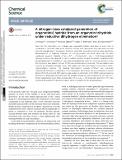A nitrogen-base catalyzed generation of organotin(II) hydride from an organotin trihydride under reductive dihydrogen elimination
Date
01/08/2015Metadata
Show full item recordAbstract
Since their first description over a decade ago, organotin(II) hydrides have been an iconic class of compounds in molecular main group chemistry. Among other approaches they have been accessed from the hydrogenation of distannynes. We herein report their accessibility from the other direction by dehydrogenation of organotin trihydride. On reacting pyridine and amine bases with the bulky substituted organotin trihydride Ar*SnH3 (Ar* = 2,6-trip2(C6H3)–, trip = 2,4,6-triisopropylphenyl) hydrogen evolution was observed. In case of catalytic amounts of base the dehydro-coupling product diorganodistannane Ar*H2SnSnH2Ar* was obtained quantitatively whilst for excessive amounts (>4 eq.) the monomeric base adduct to known Ar*SnH was obtained almost exclusively. The base adducts were found to be remarkably thermally robust. They readily react with polar fulvenic CC-bonds in hydro-stannylenylation reactions. The resulting half-sandwich complex Ar*SnCp* was structurally characterized. Moreover, on application of less nucleophilic amine bases, the uncoordinated, in solution dimeric [Ar*SnH]2 is formed. NMR spectroscopic studies on the kinetics of the DMAP-catalysed reductive elimination of dihydrogen were performed. The activation energy was approximated to be 13.7 kcal mol−1. Solvent dependencies and a kinetic isotope effect KIE of kH/kD = 1.65 in benzene and 2.04 in THF were found and along with DFT calculations support a polar mechanism for this dehydrogenation.
Citation
Sindlinger , C P , Stasch , A , Bettinger , H F & Wesemann , L 2015 , ' A nitrogen-base catalyzed generation of organotin(II) hydride from an organotin trihydride under reductive dihydrogen elimination ' , Chemical Science , vol. 6 , no. 8 , pp. 4737 - 4751 . https://doi.org/10.1039/c5sc01561h
Publication
Chemical Science
Status
Peer reviewed
ISSN
2041-6520Type
Journal article
Description
CPS thanks the Fonds der chemischen Industrie and the Studienstiftung des deutschen Volkes for PhD research scholarshipsCollections
Items in the St Andrews Research Repository are protected by copyright, with all rights reserved, unless otherwise indicated.

